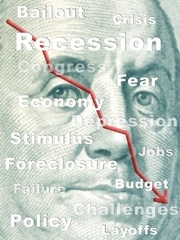Has the Great Recession Hit Rock Bottom Yet?
The 1920s were all about swingers and speakeasies, solidly-built pre-war co-ops, and prosperity. In the early 1930s, the boom went bust and millions of families lost everything. You could argue we hit rock bottom again in 1937 when the government’s rebuilding effort stalled and World War II was on the horizon.
By the late 1940s, when the veterans started coming home and buying houses, it was understood the United States was headed for a better place economically.
How do you know you’ve hit rock bottom in a recession? The truth is that time is the lens through which we see economic cycles. We call the beginning and end of a recession in arrears, after companies report their inventories and sales, and the government tells us how many people are still employed.
Looking back over decades, themes of prosperity, growth, contraction appear. We can see the highs, lows, and trends quite easily. It’s the daily slog through the muck of our financial lives that wears us out.
Wouldn’t it be great to have a series of signposts to let you know when the economy hits rock bottom? I know I don’t have all the answers, but here are a few things I’m watching for as evidence that the economy is starting to turn around:
1. New bad news just doesn’t seem as awful as the old bad news. I don’t know whether we’re all just getting acclimated to bad news, or that the new bad news we’re hearing just doesn’t compare in scope with the catastrophic language used around the time that Lehman Brothers went under. Or, maybe everyone just went to Deborah Tannen’s class in recession-speak. While Ben Bernanke continues to warn that we’re not yet out of the woods, we’re not hearing news that makes me think we’re headed over the cliff either. And frankly, the idea that Bank of America needs another $10 billion capital when we’ve already spent $150 billion on AIG, twice that on Detroit, and more than $3 trillion bailing out the economy, just doesn’t seem as scary as it did nine months ago.
2. Homes are starting to sell, and not just at 10 cents on the dollar. Some agents say their business is picking up and sales have been posted on the boards in the office. Real estate attorneys are starting to get calls for deals. Title companies, some of which look like dark, empty caves rather than places people come together to close on deals, are also getting calls. Insurance policies are being ordered. Most of the deals being done are foreclosures. Some are being sold at 10 to 15 cents on the dollar. But a few of the deals I’m hearing about are for prices that are below list price, but not 50 percent below list price. In many markets, nothing is moving. But activity is starting to stir in some places, like neighborhoods in Los Angeles, Chicago, Dallas and Atlanta.
3. Customer service falls back (a bit). When times are tough, and no one is that busy, savvy companies will provide outstanding customer service. Whether you’re calling a real estate agent, department store, or the phone company, a recession often means that you can get people on the phone, resolve complaints, ask for extra discounts, make odd requests – and the company will do its best to accommodate you. When you start feeling like a company’s customer service isn’t that outstanding anymore, one reason could be that business has picked up.
4. Job loss fears ease. As I’ve written many times, if you want to put a floor in the housing market, you’ve got to make people feel like they’re going to keep their job. If you don’t have a job, you’re not going to make your mortgage payments, credit card payments, car payments, or school loan payments. You’re not going to pay taxes, insurance premiums, or buy gas for your car (especially after you max out on your credit card). Look around and listen: What are your neighbors talking about? When they stop talking about losing their job, and start talking about new business opportunities, getting a raise or a promotion, and how committed they are to their companies, you know we’re heading in a different direction.
What signs are you seeing that the economy has hit rock bottom? I’ll share the responses I receive with you in a future column.
May 6, 2009







Leave A Comment